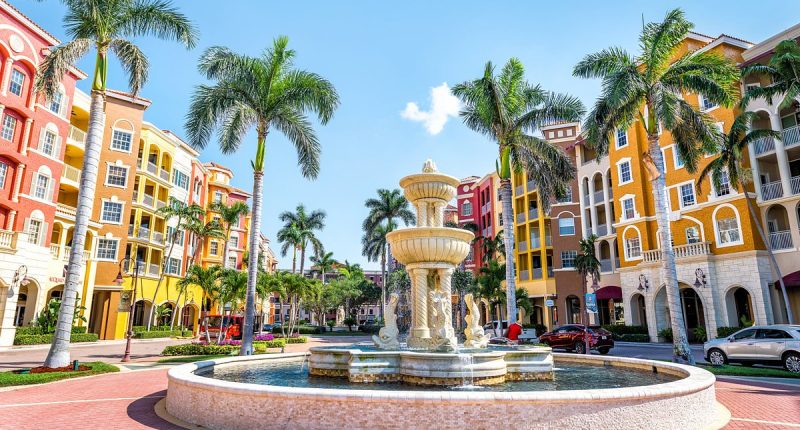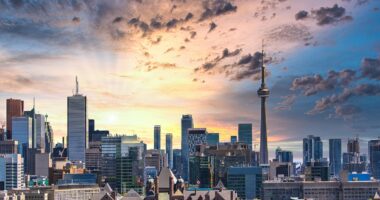Share this @internewscast.com
Canadians are cutting ties with America — even if it means giving up their dream vacation homes.
Thousands have put their Florida properties and other US homes on the market after President Donald Trump threatened to annex Canada.
Canadian elementary school teacher Nathalie Mancuso sold her Palm Beach condo after Trump’s threat to make Canada ‘the 51st state’.
‘The final decision was based on the political situation, we were scared of what might happen,’ Mancuso told the Wall Street Journal.
Mancuso had owned her Florida property for just six years, and sold it in March for $235,000.
The rising homeowners’ association (HOA) fees and falling Canadian dollar were also factors in her decision to sell up.
Trump has been feuding with America’s northern neighbor over immigration, trade and drugs since taking office in January.
His aggressive tariffs sparked a wave of economic patriotism under the ‘Buy Canada’ movement, which encourages Canadians to spend their money on homegrown products and services over US alternatives.

Quebecer Nathalie Mancuso and her husband sold their Florida property
That sentiment extended to travel, with Canadians skipping vacations south of the border — and now to selling their American properties.
Around a tenth of the 800,000 Canadians living in America, are settled in the president’s beloved state of Florida.
Those selling face falling prices as Florida’s housing market is already struggling with an oversupply of homes, and the wave of new listings could worsen the glut.
In fact, a recent study found that three of the five US metro areas most at risk of a housing market crash in 2025 are in Florida — Winter Haven, Tampa, and West Palm Beach.
Known as ‘snowbirds’, many Canadians fly down to the Sunshine State to escape the brutal winters of the Great White North.
‘Canadians feel really disrespected,’ Palm Beach realtor Jeff Lichtenstein told the Daily Mail. ‘They don’t feel comfortable in the United States right now.’
Lichtenstein said he is seeing an uptick of Canadian clients calling off real estate deals at the last minute.
‘The buyer thanked me but said that, unfortunately, due to the current political climate, they would not be purchasing a home in the United States,’ Lichtenstein says.

Alberta residents Dale and Tracy McMullen recently sold their winter home in Arizona

Real estate agent Jeff Lichtenstein, CEO of Echo Fine Properties in Palm Beach Gard

There is a large Canadian population in Florida but people are fleeing the state over MAGA

Boynton Beach, Florida draws Canadians for its quiet beaches and delicious food
He also described another Canadian client ready to list their home in the Sunshine State, even though they know selling in the current climate may come with a 10 per cent loss – or more.
Arizona is also a hotspot for Canadians with second homes in America.
Dale and Tracy McMullen bought a property in Phoenix to escape the Alberta cold, but have now sold up.
‘We’ve been tolerating the poor dollar for a few years, hoping that it would get better. But now this political mess with the U.S. and Mr. Trump It’s very, very insulting,’ Dale told Global News.
‘We had many people stop and apologize for what’s happening. And they feel terrible,’ Dale said of his Arizona neighbors.
Seen as particularly offensive is Trump’s executive order directing the Department of Homeland Security (DHS) to ensure that ‘aliens’ – including Canadians – comply with their duty to register with the US government or face a $5,000 fine.
As of April 11, any non-resident staying in the US for 30 days or longer will need to be registered with the DHS and anyone over the age of 14 will need to be fingerprinted.
Refusal to do so can lead to six months imprisonment, a prospect that has many Canadians in Florida fearful.

Beautiful Boca Raton has a large Canadian presence but the future looks grim

Canadians living in Florida liked to travel back and forth between the US and Canada freely

Boca Raton is expected to see Canadians selling their homes over tariffs and MAGA rules

Donald Trump has also said repeatedly that he wants to make Canada the 51st state
On top of that, another ‘mandatory documentation’ law is turning Canadians off.
After they register, Canadians are among those who now must carry their ‘proof of alien registration’ document at all times while in the US. If they fail to do so, it is considered a criminal offense and could be met with a $5,000 fine, jail time or both.
Canadian-heavy communities in Florida include Delray Beach, Boynton Beach, and Boca Raton, where Lichtenstein is seeing a boom in listings from Canadian owners.
‘One resident told me they’ve lived in a senior community for 13 years and had a great experience, but now they’re anxious and considering selling,’ he says. ‘They don’t see an end to this.’
Red cities will also be most hurt by a trade war with Canada, according to new data by the Canadian Chamber of Commerce.
Canada currently is under a ten percent US tariff, while additional tariffs have been paused for 90 days subject to negotiation.
‘If tariffs start affecting Canadian businesses, frustration will only grow. A lot of the vitriol that’s being talked about will become real. If tariffs affect somebody’s business, that’s a big deal. If it becomes more difficult and the tariffs stick and go on for a long period of time, more Canadians will leave,’ Lichtenstein says.
‘So if you’re a Canadian business owner, you may feel that your business is being harmed. Why would you want to do business in the country that’s harming it?”
Canada and Florida specifically have had a long and friendly relationship. Canada buys more of Florida’s produce and agriculture-related products than any other nation, according to The Palm Beach Post.
Canada also buys 40 per cent of its seafood from Florida.
Lichtenstein says there are some holdouts that are thinking of selling but haven’t pulled the trigger yet because they’re still hoping the US-Canadian battle will eventually calm down.
The remaining Canadian community in Florida have been supportive of one another, with clusters of Canadian residents who have opened their own successful bars and shops that they frequent together.
‘There’s Canadian hangouts with hockey on TV where they all go,’ Lichtenstein says.
For the ones who plan on returning to Canada, they will once again have to brave freezing cold winters if they stay there year-round. For those not going home, they are now considering moves to tropical locales not in the US.
‘Mexico, Costa Rica, those are two I’ve heard,’ Lichtenstein says.







